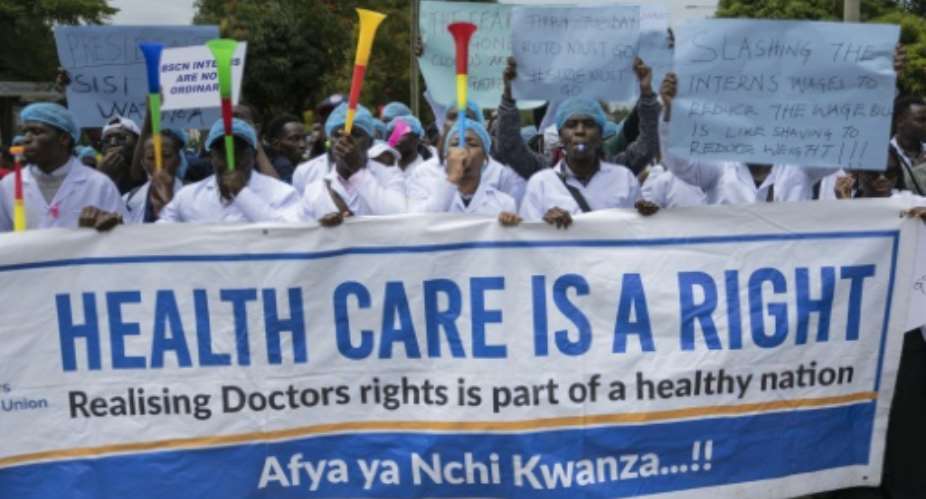Kenya's government has signed a deal with striking doctors, the health ministry announced Wednesday, after almost two months of industrial action that left thousands of patients struggling to find medical care.
"After long and painstaking negotiations that ran into the wee hours of the night for many days... we have signed a return to work formula and the union has called off the strike," Health Minister Susan Nakhumicha told reporters.
The Kenya Medical Practitioners, Pharmacists and Dentists Union (KMPDU) had launched the action in mid-March, with several rounds of talks collapsing over higher salaries for interns, who make up about 30 percent of doctors.
President William Ruto's cabinet had previously said it was "unsustainable" to pay the interns a monthly stipend of 206,000 Kenyan shillings ($1,530) -- as stipulated in a 2017 agreement following an earlier strike -- and instead offered $530.
But the doctors, numbering some 7,000 in total, had vowed not to return to the negotiating table if the agreed pay level for interns was not restored.
The matter is yet to be settled, according to a copy of the signed deal seen by AFP, with both parties agreeing on Wednesday to "commence and conclude negotiations on the issue within 60 days".
"There shall be no deployment and or posting of medical officer interns, pharmacists interns, and dental interns" while negotiations continue, according to the agreement, which also stipulates that all other doctors would return to work within 24 hours of the signing.
Under the deal, the doctors will over the next five years receive salary arrears amounting to 3.5 billion shillings (about $26 million) -- reflecting unpaid wage hikes stipulated in the 2107 agreement.
'Must find lasting solution'
KMPDU secretary general Davji Atellah told reporters the issue over interns' salaries remained "pending", but confirmed that the strike was now over.
"Despite having said and stated that we would not go home with promissory notes, we have decided to take the promise for the last time," he said.
Nakhumicha said she was "confident that... this is a deal that is going to be implemented by all of us."
 The strike left hospital beds empty. By SIMON MAINA (AFP/File)
The strike left hospital beds empty. By SIMON MAINA (AFP/File)
"We must find a lasting solution to these perennial issues," she added.
A labour court had ordered the union to suspend the strike in March. It then set multiple deadlines for the standoff to be resolved, with the latest cut-off due to lapse on Wednesday.
Strikes over working conditions in public hospitals are common in Kenya, leaving a trail of suffering and often triggering an exodus of Kenyan medics to other African countries and further afield.
In 2017, doctors staged a 100-day nationwide strike that forced public hospitals to shut. Dozens of patients died from a lack of treatment until the collective bargaining agreement was reached.
But doctors accused the government of reneging on some parts of the deal, leading them to strike again this year.
The eight weeks of industrial action threw Kenya's public hospitals into crisis, running with a skeleton crew as patients scrambled to find treatment in the absence of doctors.
Waterborne diseases
Lobby groups voiced concern that expectant mothers were shouldering the biggest burden of the walkout, pointing to the dangers of managing cases requiring specialised care without doctors on hand.
Deadly floods due to heavier than usual rains have added to the health woes facing Kenyans, with the UN and non-profit organisations sounding the alarm about the spread of cholera and other waterborne diseases.
"The crisis in accessible healthcare services caused by the Kenyan medical workers' strike has been compounded by major flooding across the country," said Jeffrey Okoro, executive director of non-profit CFK Africa, which operates a maternity facility in Kibera, the country's largest urban slum.
"Flood waters have mixed with pit latrines and the sewer system, causing a greater threat of waterborne diseases like cholera (an ongoing issue in Kenya), typhoid, and dysentery."





 4,300 Liberians at Buduburam Refugee Camp to return home
4,300 Liberians at Buduburam Refugee Camp to return home
 Two dead in premix fuel depot explosion at Essikado-Ketan
Two dead in premix fuel depot explosion at Essikado-Ketan
 Driver of President Akufo-Addo convoy SUV dies in road crash
Driver of President Akufo-Addo convoy SUV dies in road crash
 Akufo-Addo's convoy in fatal crash
Akufo-Addo's convoy in fatal crash
 Mepe flood victims still in tents 8months after Akosombo Dam spillage
Mepe flood victims still in tents 8months after Akosombo Dam spillage
 Kpemka’s appointment as Deputy BOST MD is unconstitutional – Kwabena Donkor
Kpemka’s appointment as Deputy BOST MD is unconstitutional – Kwabena Donkor
 Voter registration: Two Togolese Nationals arrested in Buem for attempting to re...
Voter registration: Two Togolese Nationals arrested in Buem for attempting to re...
 DR Congo thwarts Kinshasa 'coup attempt': army
DR Congo thwarts Kinshasa 'coup attempt': army
 Media has made good progress in Ghana — Frema Opare
Media has made good progress in Ghana — Frema Opare
 Election 2024: NDC pledges to scrap betting tax, targets 80% youth support
Election 2024: NDC pledges to scrap betting tax, targets 80% youth support
